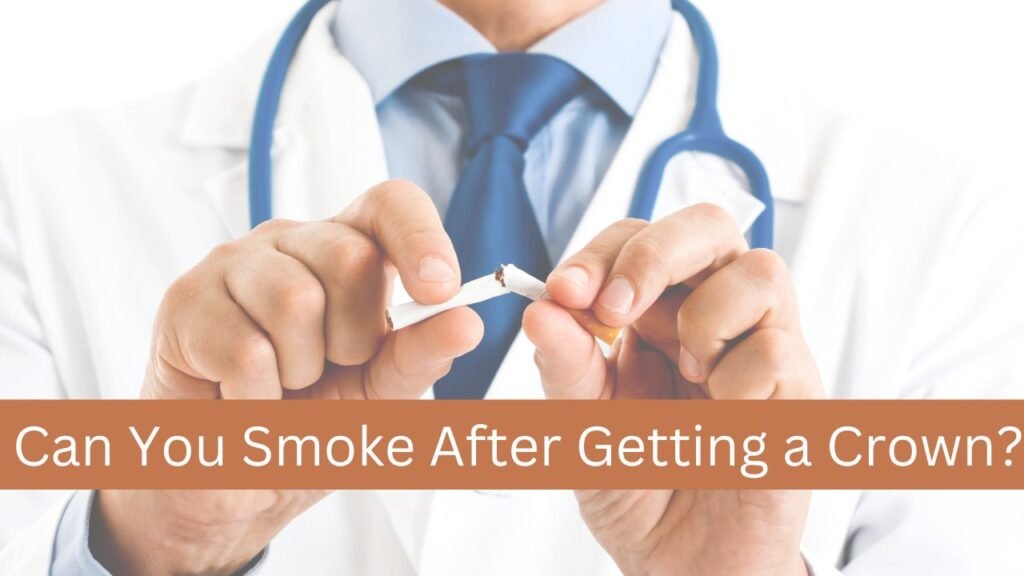Summary of Key Risks of Smoking After Dental Crown
- Delayed Healing: Smoking irritates gums and reduces blood flow.
- Increased Infection Risk: Compromised immune system and gum tissue.
- Crown Dislodgement: Heat and chemicals weaken cement.
- Gum Disease: Smoking weakens gums and exposes crown edges.
- Staining: Tar and nicotine discolor crowns.
- Oral Cancer: Increased risk from carcinogens in cigarettes.
If you’ve recently had a dental crown placed and are a smoker, you’re likely wondering if it’s safe to light up. Smoking after dental crown can impact the healing process and lead to several complications.

It’s recommended to avoid smoking for at least 24-48 hours post-procedure to ensure optimal healing. Let’s dive into how smoking affects your new crown and what you can do to protect your investment in your dental health.
The Healing Process After Crown Placement
After getting a crown, your mouth requires time to heal.
Here’s what to expect:
- Initial Sensitivity: You might experience sensitivity and discomfort initially. This is normal and should subside with time.
- Healing Period: Proper healing is crucial for the longevity of your crown. Maintaining good oral hygiene during this period can prevent complications.
- Oral Hygiene: Brushing, flossing, and using an antibacterial mouthwash are vital to aid in healing and ensure your crown stays intact.
How Smoking Affects Crown Healing
Smoking can severely hinder the healing process in several ways:
- Gum Irritation: Chemicals in cigarettes irritate gums, causing inflammation and delaying healing.
- Reduced Blood Flow: Nicotine constricts blood vessels, reducing blood flow to the gums, which is essential for delivering nutrients and oxygen necessary for healing.
- Increased Infection Risk: Smoking weakens the immune system, making it harder for your body to fight off infections, which can lead to serious complications around the crown area.
- Impact on Taste and Smell: Smoking can dull your taste buds and sense of smell, reducing your enjoyment of food and potentially leading to poor dietary choices during recovery.
Potential Risks of Smoking After Crown Placement
Continuing to smoke after getting a crown can lead to several complications:
- Crown Dislodgement: The heat and chemicals from cigarettes can weaken the cement holding your crown, increasing the risk of it becoming loose.
- Gum Disease: Smoking can lead to receding gums, which might expose the edges of your crown, making them more susceptible to decay.
- Peri-implantitis: For crowns on implants, smoking can increase the risk of peri-implantitis, a serious condition affecting the tissues around the implant.
- Staining: Tar and nicotine can discolor your crown, making it look unsightly.
- Oral Cancer: Smoking significantly increases the risk of developing oral cancer due to the carcinogens in cigarettes.
Financial Repercussions
Smoking-related complications can lead to additional dental expenses. You might need crown replacements or treatments for gum disease, which can be costly and time-consuming.
Alternatives to Smoking During Recovery
Consider these alternatives to smoking while you heal:
- Nicotine Gum or Patches: These can provide the nicotine your body craves without the harmful effects of smoking.
- Healthy Distractions: Engage in activities that keep your mind off smoking, such as exercise, reading, or hobbies.
- Quitting Smoking: Use this recovery period as an opportunity to quit smoking altogether. The benefits extend beyond dental health, improving your overall well-being.
Long-Term Effects of Smoking on Dental Health
This YouTube video below by Provident Dentistry explains how smoking affects oral health. It highlights risks like gum disease, staining, and slow healing. These insights support healthier dental care decisions.
Smoking has long-term implications for your dental health:
- Weakened Immune System: A compromised immune system makes it harder for your body to fight off infections and heal properly.
- Increased Risk of Gum Disease: Smokers are more prone to gum disease, which can lead to tooth loss and further dental complications.
- Bad Breath: Smoking can cause persistent bad breath, affecting your social interactions and self-confidence.
Conclusion
Smoking after getting a crown poses significant risks to your dental health. From delaying the healing process to increasing the likelihood of complications, the negative impacts are substantial. Following your dentist’s instructions and avoiding smoking can help ensure optimal healing and longevity for your crown. Consider the long-term benefits of quitting smoking, not only for your dental health but for your overall well-being.
People Also Ask
Can I vape after getting a crown? Vaping can still expose your gums to harmful chemicals and is not recommended immediately after crown placement.
How long should I wait to smoke after getting a crown? It’s best to avoid smoking for at least 24-48 hours after getting a crown to allow proper healing.
What are some tips for quitting smoking after dental work? Consider nicotine replacements, find healthy distractions, and seek support from friends, family, or professional groups.
Find Your Perfect Dentist
Easily book appointments with top-rated dentists in your area
Need Emergency Dental Care?
Get immediate help from verified dental professionals